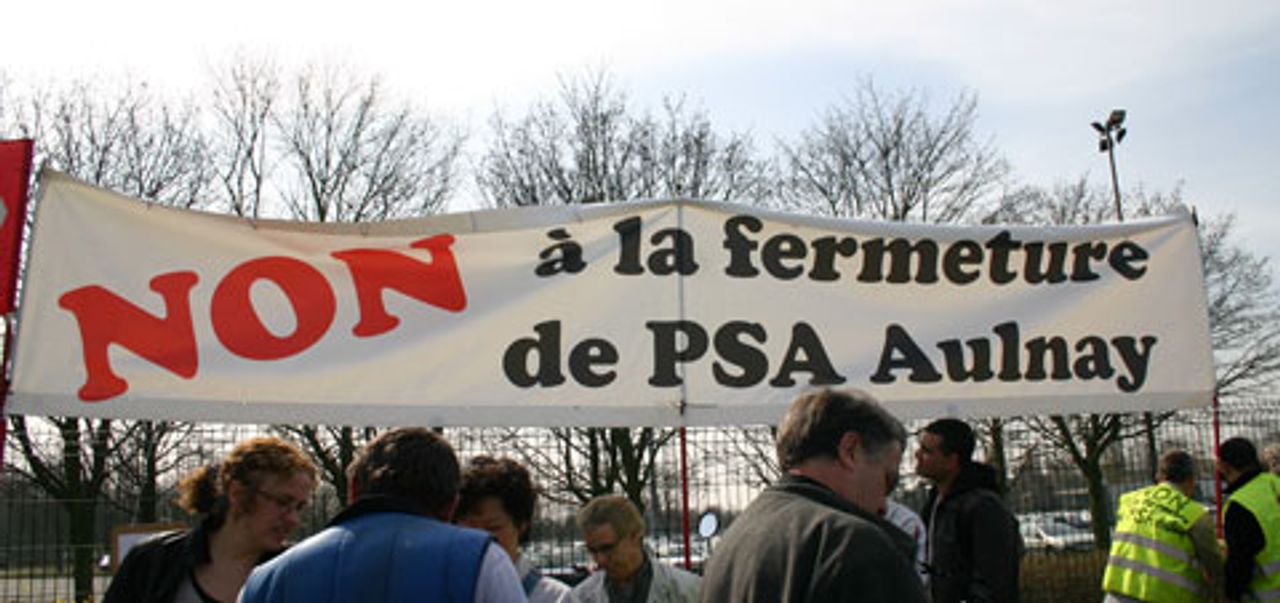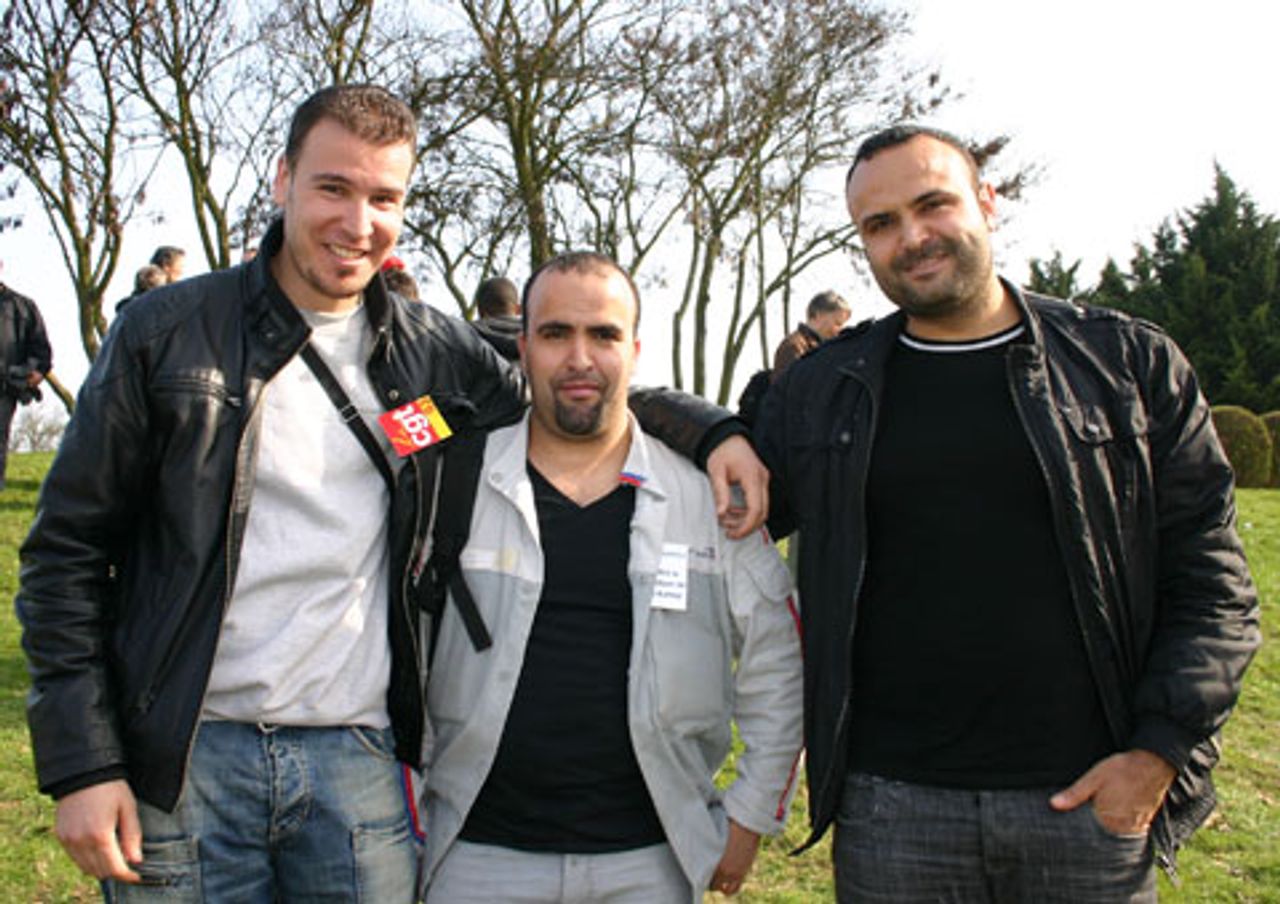WSWS reporters attended a March 22 protest organized by the General Confederation of Labor (CGT) union at the PSA auto plant in Aulnay, north of Paris.
The CGT had called a one-day inter-professional protest by its locals in the Paris metropolitan area at the Aulnay plant, which is slated for closure amid PSA restructuring plans and a proposed tie-up with GM.
 The banner reads “No to the closure of PSA Aulnay”
The banner reads “No to the closure of PSA Aulnay”Despite widespread popular opposition to plant closures, only a few hundred people attended the CGT’s rally, reflecting broad popular disillusionment with struggles organized by the unions. A number of union officials surrounded the platform, while shop stewards from various firms and a few Aulnay workers sat on a nearby hill, listening occasionally to the loudspeakers.
A small brass band next to the platform played the Internationale as CGT bureaucrats prepared to deliver their remarks. The strains of the revolutionary anthem of international working class solidarity made an odd contrast with the official speeches, which focused only on the CGT’s proposals for state policies in Paris.
One would never have known that Aulnay workers stand with tens of thousands of other workers—in Spain, Britain, and Germany, as well as in France—against cuts arising from the reorganization of GM’s European operations, which comes after devastating 50 percent wage cuts imposed on US auto workers. The CGT did not raise the possibility of a common struggle of auto workers throughout Europe and on both sides of the Atlantic against job cuts and plant closures.
Instead, CGT officials sought to prepare another regional struggle, essentially isolated to the Aulnay plant. The auto industry has isolated and smashed a series of struggles against plant closures throughout the French car industry since 2009—at New Fabris, Continental, Sodimatex, etc. Well aware that their strategy will produce this result, the CGT tops cynically tried to give their policy of defeat a “militant” veneer.
The first speaker, Paris regional director Pascal Joly, criticized President Nicolas Sarkozy’s urbanization plans for the Paris area. Another CGT official noted that PSA executive Frédéric St Geours had been nominated to head the UIMM (Union of Metallurgical Industries) employers’ federation, which was involved in 2007 in a scandal involving UIMM financing of the unions via illegal payoffs. The CGT official kept quiet about the scandal and what it said about the union bureaucracy, but simply shouted that the CGT would nonetheless wage militant struggles.
CGT general secretary Bernard Thibault sat stone-faced during the introductory speeches. When he spoke, he discussed public policy towards the auto industry and told workers to elect militant union representatives at their workplaces: “It is high time for workers to make an effort and send their elected representatives into the enterprise councils so as to influence political strategy.”
 Aulnay workers Boudchar Brahim, Moutaouakil Lahoussine, & Azahriou Abdelaziz
Aulnay workers Boudchar Brahim, Moutaouakil Lahoussine, & Azahriou AbdelazizWSWS reporters spoke to a group of SNCF (French National Railways) shop stewards at the rally. They noted that the Aulnay plant, which employs some 3,100 workers, is a “central source of jobs in the area”—other employers being the Paris Nord shopping center and Charles de Gaulle airport. The closure of the plant would devastate Aulnay and all of Paris’ outer northeast suburbs.
Speaking on conditions at the SNCF, they indicated that they were personally not too hard hit, though there were substantial wage cuts being prepared. Since 1982 some 250,000 jobs had been lost, and the SNCF work force was now under 150,000 people.
Asked about the impact on auto workers in Europe of the deep wage cuts negotiated by the United Auto Workers (UAW) in the United States, they said the CGT would oppose any such accord in France: “The CGT will not settle on such an agreement.” When WSWS reporters asked their opinions of the negotiations that are now taking place between the UAW, the CGT, and other European unions on restructuring the car industry, the stewards simply claimed that reports of such negotiations were false (see: “French unions prepare to back cuts in PSA-GM tie-up”).
WSWS reporters also spoke to a group of Aulnay workers. They described conditions in the plant as “harder and harder,” and workers inside the plant as deeply concerned. One assembly line was closed down since 2007 and night work eliminated. They also said that plant management is gradually moving equipment out and reducing inventory at Aulnay, to make it easier for them to close the plant.
Over the last decade, the plant went from employing over 7,000 workers to its present level of 3,100, with workers facing significant speedup to maintain output. Also, it has become virtually impossible for temp workers, who are paid only €900 to €1,200 ($1,200 to $1,600) per month, to get a full-time job. Full time workers face losses of €100 to €150 due to reduced hours.
Asked about the unions, one worker said: “Most of them, on the level of their relations with workers, are controlled by the bosses. It divides the factory between those who pay their dues”—roughly 300 workers of 3,100—“and those who do not.” He noted that the CGT had not signed contracts that were unfavorable to workers at the Aulnay plant.
Workers also find it difficult to go on strike, as the CGT often does not pay strike benefits: a six-week strike in 2007 caused significant hardship, as many workers have still not paid off debts they contracted during the strike.
